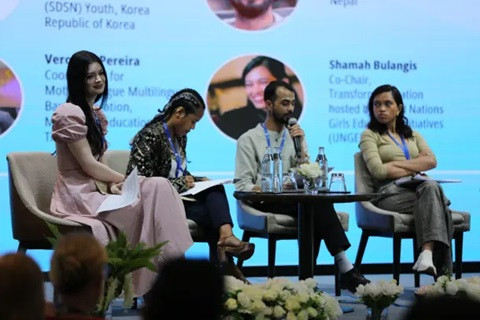
GCED Basic Search Form
Quick Search
أنت هنا
الأخبار

UNESCO reaffirms the centrality of education in advancing peace and sustainable development.
2 July 2024
Half a century onward, UNESCO’s 1974 Recommendation remains the landmark legal instrument consecrating education’s primary role in promoting peace, international understanding, human rights and fundamental freedoms.
Recognizing the need for a framework on how education should evolve in the twenty-first century, the Recommendation on Education for Peace, Human Rights and Sustainable Development was unanimously adopted by all 194 UNESCO Member States in November 2023 as a significant update to the original 1974 Recommendation.
The revised Recommendation responds to twenty-first-century complexities by underscoring the interconnections among various issues from gender equality, digital transformation and climate change, to human rights, health, well-being and cultural diversity – all critically important issues for the Asia-Pacific region.
In this light, UNESCO and the Asia-Pacific Centre of Education for International Understanding (APCEIU) co-organized the Regional Policy Dialogue and Launch of the ‘Recommendation on Education for Peace, Human Rights and Sustainable Development’ in Asia-Pacific, from 5 to 7 June 2024, in Bangkok, with support from the Centres of Asia-Pacific Excellence (CAPEs), the New Zealand Centre for Global Studies, and Sophia University, Japan. The conference was co-hosted by Thailand’s Ministry of Education. Nearly 150 participants from over 20 countries across Asia-Pacific gathered in Bangkok for this inter-disciplinary event.
In welcoming remarks, Soohyun Kim, Regional Director of the UNESCO Regional Office in Bangkok, underscored the transformative power of education for fostering tolerance among diverse peoples, as well as between humanity and the planet.
"Education must be a transformative force in the lives of all learners. By instilling in learners greater empathy, tolerance, and respect for human diversity, education can lay the foundation for the peaceful coexistence among all nations, peoples, and between humanity and nature."
Soohyun KimRegional Director, UNESCO Regional Office in Bangkok
Reflecting the whole-of-society approach of the Recommendation towards advancing peace, human rights, and sustainable development through education, participants in the three-day conference came from a wide range of sectors, some extending well beyond the education field.
In his keynote speech, Thailand Minister of Education Permpoon Chidchob spoke of the importance of collaboration to work towards sustainable development both within and beyond all national borders.
"We have leveraged the existing UNESCO Associated Schools Network to promote education aimed at fostering both sustainable development and global citizenship."
Police General Permpoon ChidchobMinister of Education, Thailand
The interconnectedness of the world’s problems among diverse peoples, a theme taken up by the conference’s multisectoral programme, was stressed by Hyun Mook Lim, Director of the Asia-Pacific Centre of Education for International Understanding (APCEIU), which co-organized the event with UNESCO.

"Climate change and the rapid development of AI are posing great challenges for us. But they do not exist in an empty space. They are tied to already existing problems which we have not yet solved."
Hyun Mook LimDirector of the Asia-Pacific Centre of Education for International Understanding (APCEIU)
During the launch session of the Recommendation for the Asia-Pacific, Christopher Castle, Director of the Division for Peace and Sustainable Development at UNESCO, introduced the key highlights of the revised Recommendation. He emphasized that the vision of the Recommendation is guided by a broadened understanding of peace, which is anchored in human rights. This vision views peace as a positive and participatory process, nurtured daily through the upholding of the dignity, rights, and capacities of every individual.
"One of the important things about this recommendation was realizing and agreeing that peace is more than just the absence of conflict and violence. It's more than that, and it requires us to make positive efforts, to work towards the conditions, the foundation, the mindset, the culture, and that is one of the things that I think is truly inspirational in the new Recommendation."
Christopher CastleDirector of the Division for Peace and Sustainable Development, UNESCO Headquarters, Paris
The meeting stimulated dialogue through a series of informative and lively plenary sessions, panel discussions, and collaborative workshops among diverse stakeholders, all addressing the challenges and opportunities for translating the Recommendation’s broad vision and key guidelines into holistic, interdisciplinary action across Asia and the Pacific. For example, the exemplary plenary session, ‘Co-Creating our Roadmap to the Future: Youth Perspectives on the Recommendation’, co-led by Asia-Pacific members of the SDG 4 Youth and Student Network and UNESCO, facilitated intergenerational dialogue, allowing youth panelists and participants to exchange insights on how the Recommendation might best address young people's needs in the region.
Over the course of three days, the meeting convened four expert-led panels of speakers from diverse backgrounds related to the Recommendation's key action areas of Policy; Capacity Development and Monitoring; Curriculum, Pedagogy and Assessment; Teacher Development; and Lifelong Learning (LLL). Key discussion points included the urgency of enhancing critical thinking, adopting media literacy, strengthening SDG 4.7 Sustainable Development and Global Citizenship monitoring, and follow-up evaluation.
Throughout the panel discussions, participants emphasised reshaping education to focus on social cohesion, equity, and equality, while ensuring everyone's human rights. This requires a safe, respectful ecosystem, and shifting from current academic stresses towards a more holistic educational agenda. Discussants highlighted the need for transformative pedagogies, strengthening teacher training and autonomy, and redefining assessment for holistic student development. It was widely agreed that education for peace, human rights, and sustainable development should extend well beyond schools and classrooms, integrating these values into societies and communities for lifelong and life-wide learning.
One of the Conference’s key activities was to engage participants and gather their feedback for the co-creation of a regional ‘Roadmap’ for diverse stakeholders, expressly to integrate the updated Recommendation into Asia-Pacific national education policies and practices.
URL: https://www.unesco.org/en/articles/putting-peace-heart-education-asia-pacific?hub=66924
